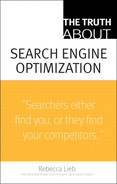Paying for links is certainly a gray area (see Truth 23, “The jury is out on paid links”), partially because search engines frown upon the practice, and partially because any paid link is regarded as advertising, rather than as “pure” organic search optimization.
Yet because virtually every online ad contains a link back to the advertiser’s web, product, or brand site does present an unavoidable fact that can affect search optimization: These paid links can and do affect search rankings. Paid advertisements can, therefore, be considered to be part of a linking strategy. This, in turn, makes them worthy of consideration in a discussion of SEO.
It’s at least in part (if not wholly) for this reason that many leading advertising-supported websites—including many that cover search engine marketing and advertising—carry “sponsored by” ads on their homepages or in other site sections. Companies offering products and services related to SEO and SEM are naturally eager to have links to their own sites from some of the leading editorial properties in the industry, and are, therefore, willing to buy their way into guaranteed, long-term links back to their offerings.
The same holds true, of course, for editorial properties in other vertical business industries. SEO has, in short, established a new reason for buying advertising or sponsorships on relevant, high-quality, third-party sites. The reason? A prominent link from a quality website back to the advertiser’s own site is too valuable to ignore.
The same holds true of sites that sell directory listings, as well as enhanced and expanded listings in existing directories. Think of your local Yellow Pages as a corollary. All the locksmiths in a given city or neighborhood might be listed in that directory, but some locksmiths find value in paying for a larger or more prominent ad with an additional phone number (the Yellow Pages equivalent of a link) to highlight their business listing, offering, and relevance to that particular segment of the directory.
Buying online ads wholly or in part for the value of the link is certainly a tactic to consider when plotting a link strategy. It’s important to bear in mind, however, that links in ads still qualify as paid links in the strictest sense of the term. As such, the possibility that their “link juice” is discounted, discredited, or diluted by the search engines because of the fact that they do appear in ads does exist. Very possibly, search engine algorithms can “read” this information based on the placement of ads on the publisher’s page, or the fact that such ads might appear under a heading such as “site sponsors,” and thereby be partially or wholly discredited as valid links. A very small handful of publishers might also place links within the “nofollow” attribute (see Truth 28, “Putting the kibosh on link love with nofollow links”) so that the link’s target is not “counted” toward search engine ranking.
Although using the nofollow attribute is the method Google prefers, the sites and publishers that have adopted the technique are few and far between. Publishers, for obvious reasons, are much more focused on keeping their advertisers happy—at least, until Google starts paying their bills.
Even when ads are purchased purely as advertising rather than as part of a link-building strategy, it’s worthwhile taking the significance of the links in an ad into account. If the link is embedded in a text ad, that text should be relevant to the offer and the landing page, rather than a more generic “Interested? Click here for more information.”
There’s no reason to throw SEO learnings out the window when working with other aspects and channels of interactive marketing and media. So, even when an ad is only an ad, remember that it’s also a link, too. Why not wring out all the link juice you can?
